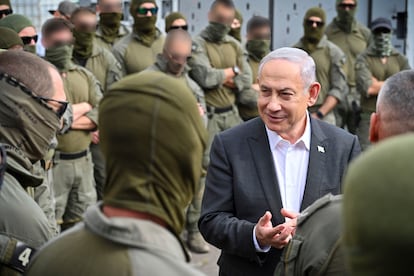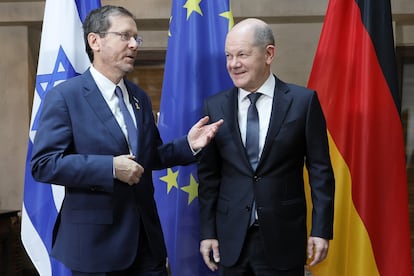Nobody is stopping Benjamin Netanyahu
The Munich Security Conference has shone a spotlight on the international community’s failure to act as the suffering of Gaza civilians worsens


The three-day Munich Security Conference has been the stage for discreet dialogues and public messages from political leaders about the Israel-Hamas conflict and the destabilization of the Middle East. In the German city, a broad consensus has emerged on the roadmap to follow, with the first stage involving a cease-fire, release of hostages, entry of humanitarian aid. This would take place, in parallel, with a process leading to the establishment of a Palestinian state, with security guarantees for Israel and the normalization of its relations with Arab countries. The outlines of this roadmap have been repeated — with some degree of variation — by Arab, European, American and Asian leaders. What’s missing is the will or the ability to convince the two sides to go down that path, particularly when it comes to the leader in the position of strength: Israeli Prime Minister Benjamin Netanyahu.
Canadian Foreign Minister Mélanie Joly pointed out that while there was agreement on what needs to be done, “good dancing partners” were currently lacking. “We need an Israeli government that is willing to talk about a two-state solution,” she said. Israel, meanwhile, is preparing a possible ground offensive on Rafah, where hundreds of thousands of displaced Gazans are crammed into the southern city in Gaza in amid terrible human suffering.
Throughout his political career, Netanyahu has consistently rejected the two-state solution and strongly encouraged widening the occupation and colonization policies that erode the prospect of a viable Palestinian state. His current Cabinet includes far-right leaders, who have made very extreme comments about Palestine.
During the Munich Security Conference, which began on Friday and ended Sunday, Netanyahu once again ruled out sending representatives to the negotiations in Egypt, claiming that Hamas’ demands were “delusional.” “Israel rejects outright international dictates regarding a permanent accord with the Palestinians,” the Israel government said in a statement on Sunday. “An accord, should it be reached, will only come through direct negotiations between the sides, without preconditions,” it added.
Many experts argue that Netanyahu has a vested interest in continuing the conflict in Gaza: if the war comes to an end, it would eliminate the emergency situation that guarantees he can remain in power.
Qatari Prime Minister Mohammed al Thani told the Munich Security Council that the pattern of the talks — in which his country is closely involved — is “not very promising.” In Munich, the president of Israel, Isaac Herzog, held a meeting with Al Thani, which he described as “a good discussion.” Herzog also recognized Qatar’s “major efforts” to find solutions.

Palestinian Prime Minister Mohammad Shtayyeh said in Munich that he believes Netanyahu will continue the war throughout the year — a claim that seems to suggest the Israeli prime minister will continue the conflict until the U.S. presidential elections in November. Donald Trump, the front-runner to win the Republican nomination, is even more supportive of Israel than U.S. President Joe Biden. The president, as recently reported by The Wall Street Journal, plans to supply a new important delivery of weapons to Israel, even though he is publicly calling on Israel to exercise restraint.
Opposition but with the same objective
“I’m a political opponent of Netanyahu, but I support the war in Gaza. I support the strategic need to eliminate Hamas as a terrorist organization and as a regime,” Tzipi Livni, former foreign minister of Israel, said in a panel at Munich, evidencing the difficulty of finding allies in Israel to pressure Netanyahu.
Livni argued that peace could not be negotiated with Hamas. “It does not accept Israel’s right to exist and is a terrorist organization that deliberately aims to kill civilians. It is immoral to compare it with the action of the Israeli Defense Forces, which strive to avoid civilian casualties,” she said.
According to Palestinian sources, the death toll in Gaza since October 7, now stands at 29,000, most of whom are women and minors. Infrastructure in the Gaza Strip has been widely destroyed. The humanitarian aid entering Gaza has once again fallen to a trickle. At the Munich Security Conference, it was said that around a dozens trucks are entering a day, when an estimated 500 are needed daily.
The weakness of the Palestinian Authority (PA) and the radicalism of Hamas mean that the Palestinian side also lacks an adequate “dancing partner” in the words of Joly. Shtayyeh deflected questions about the PA’s patent ineffectiveness, accusing Israel of systematic action to weaken it. He also blamed Israel for the fact elections have not been held in Palestine for almost two decades, recalling that Israel prevented Palestinians in East Jerusalem from voting in 2021. “Let’s not look at the symptoms, let’s look at the root. The problem is the occupation,” Shtayyeh said.
Russia meeting
Shtayyeh said there was significant political movement coming from Russia, which he said has called “all Palestinian factions” to a meeting in Moscow on February 26. “We will see if Hamas is ready to come to the ground with us [...] We are ready to engage [...] We need Palestinian unity,” said Shtayyeh, adding that to be part of that unity, Hamas needed to meet certain prerequisites. The Palestinian prime minister maintained that there was no communication between Fatah and Hamas, which severed relations after the violent conflict following the 2006 elections, which Hamas won.
Russia seems to be trying to part in the mediations, which, until now, have been led by the United States and several Arab countries.
The European Union, for its part, has seen its effectiveness undermined by internal divisions. Spain and Ireland have called for a review of whether Israel is complying with human rights obligations under its trade agreement with the EU. But the initiative is seen as more of a political gesture than as a viable action.
In their addresses in Munich, both U.S. Vice President Kamala Harris and German Chancellor Olaf Scholz emphasized Israel’s right to defend itself. They did not explicitly express or hint that they were willing to increase pressure on Netanyahu’s government if Israel’s military offensive continues to cause civilian suffering that President Biden has described as excessive.
Without coming under greater pressure, Netanyahu is preparing a new phase of the offensive aimed at Rafah. The foreign ministers of Egypt and Jordan insisted in Munich that their countries will not accept a forced displacement of Gazans to their territories. The Palestinians, of course, don’t want this either. They still remember that when they left their lands seven decades ago, they were never able to return. But in Gaza, there is nowhere else left to go.
Sign up for our weekly newsletter to get more English-language news coverage from EL PAÍS USA Edition
Tu suscripción se está usando en otro dispositivo
¿Quieres añadir otro usuario a tu suscripción?
Si continúas leyendo en este dispositivo, no se podrá leer en el otro.
FlechaTu suscripción se está usando en otro dispositivo y solo puedes acceder a EL PAÍS desde un dispositivo a la vez.
Si quieres compartir tu cuenta, cambia tu suscripción a la modalidad Premium, así podrás añadir otro usuario. Cada uno accederá con su propia cuenta de email, lo que os permitirá personalizar vuestra experiencia en EL PAÍS.
¿Tienes una suscripción de empresa? Accede aquí para contratar más cuentas.
En el caso de no saber quién está usando tu cuenta, te recomendamos cambiar tu contraseña aquí.
Si decides continuar compartiendo tu cuenta, este mensaje se mostrará en tu dispositivo y en el de la otra persona que está usando tu cuenta de forma indefinida, afectando a tu experiencia de lectura. Puedes consultar aquí los términos y condiciones de la suscripción digital.








































